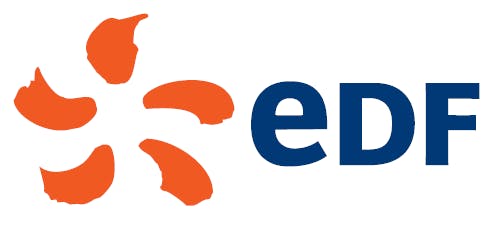- tests and e-learning, coupled with regular information campaigns in the form of factsheets and updates in this area, in addition to tailored training courses, for the various business lines or sectors.
Responsible digital transformation 3.4.4.2
Through the development of digital tools, the EDF group has stepped up its efforts to reduce the carbon footprint of both the Group and its customers. It also improves the accessibility of information, with a view to innovation and inclusion. The rapid increase in the number of visits to digital consumption monitoring platforms is clear evidence of this customer-side development.
Number of visits on digital consumption monitoring platforms (millions)

2018 : 28
2019 : 47
2020 : 73
Key non-financial performance indicator
The methodology for this indicator is set out in detail in section 3.7.2.2 "Details on performance indicators".
3.4.4.2.1 Digital technology as a vector for responsible action
The teams of the Transformation and Operational Efficiency Department (DTEO) provide electronic signature services and all types of remote collaboration services, significantly cutting the need for business travel.
By signing the “Responsible Use of Digital Technology Charter”, EDF has strengthened its goal, by formally committing to develop sustainable, inclusive and value-creating digital services. Initiated by the Institut numérique responsable (French Institute for a Responsible Use of Digital Technology) with the support of the French Ministry for the Ecological Transition, this charter is used by the Transformation and Operational Efficiency Department to structure its approach and compare its policies and results with those of other companies. The idea is to cover all issues arising from a responsible use of digital technology.
At the end of 2020, the EDF group decided to release its public data, in particular its consolidated financial statements, non-financial performance indicators, the Group’s installed capacity, the corresponding generation figures and operational data such as EDF Hydro’s average daily river flow data. It is released through an open data platform. This initiative was proposed by employees directly, as part of the “Let’s talk about energy” dialogue process (see section 3.5.1.1 “Listening practices”). The Group data is provided in a reusable, convenient format. This Group open data platform(1), initially for employees only, was opened up to the general public during the Electric Day.
In addition to the digital solutions developed and made available to customers to improve energy efficiency and comfort (see, also, section 3.1.4 “Development of uses of electricity and energy services”), the Group has also implemented digital innovative technology in the regions. Data management is a key factor in the process of identifying low-carbon potential and supporting energy transition in communities. The data expertise of EDF and its subsidiaries is shared at all stages of the services that local authorities provide:
- as part of a wide range of digital solutions, for example, EDF has released an online module allowing users to generate an initial energy review in just two clicks and identify their low-carbon potential by displaying their energy consumption, CO2 emissions and local renewable energy potential. This is merely a first step, followed by a more comprehensive energy review, integrating details about transport and building use or additional energy poverty data(2) ;
- recently, a start-up called Proxity, an EDF group subsidiary since January 2020, has developed a digital solution combined with local events for towns and a set of services for retailers and local authorities: support for promotional events in stores, local consumption data and assessments of pedestrian flows. A “Pass Proxity” is proposed, helping to promote local, sustainable consumer practices. Developed in Auvergne, this new service is well suited to towns with over 5,000 inhabitants.
3.4.4.2.2 Sensible use of digital tools
The carbon footprint of digital technology can only be reduced through a sensible use of IT and telephone systems. EDF is striving to reduce their environmental impact by extending the useful life of its hardware and favouring the circular economy. The programme initiated by EDF’s Transformation and Operational Efficiency Department covers the entire lifecycle of terminals, from their purchasing (sometimes already recycled) to their recycling.
The average electricity consumption per server operated by the Transformation and Operational Efficiency Department was halved between December 2013 and December 2017 from 0.427kWh/server to 0.214kWh/server.
Digital technology will only be responsible and sustainable if it is also accessible and inclusive. Everyone should have access, without any discrimination, to digital information and functions but for this, progress must be made in the following three inseparable areas: the IT work environment, applications and digital content. EDF’s IT operator has been working on this for several years, to pave the way for a range that promotes digital accessibility and uses suitable peripherals and software (zoom, speech synthesis, etc.) in a manner that ensures a high level of working comfort for users, particularly those with disabilities.
Digital applications are designed using development rules to facilitate their perception, understanding, interaction and use from adapted workstations. These standards are being integrated into the common application development practices (UX Design), focused on the user experience. Digital content design guides are available for communications and digital training.
In December 2019, EDF ranked second in the “eCAC 40”(3), a leading annual ranking measuring the level of progress by groups on the index, plus other big French businesses, in terms of their digital transformation. This level of performance is driven by excellent results in categories covering the Company’s digital culture, management models, and level of technological expertise.
(1)opendata.edf.fr/explore/dataset/indicateurs-de-performance-extra-financiere/table/
(2)edf.fr/collectivites/transition-energetique/bilan-energetique-de-votre-territoire?step=1
(3) Les Échos Executives, 13 December 2019, “EDF: acteur de premier plan en matière de transformation digitale” (i.e. EDF: leading light in the world of digital transformation)
